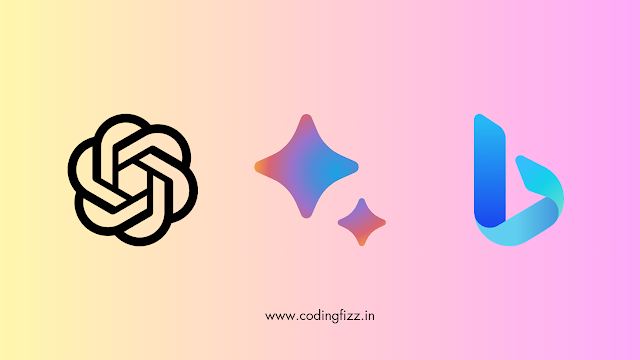In today's rapidly evolving world of artificial intelligence, language models have become effective resources for a wide range of applications, including chatbots, virtual assistants, search engines, and content creation. ChatGPT, Bard, and Bing are among of the top competitors in this market, each providing particular abilities and features.
In order to identify their advantages and disadvantages and finally establish which language model is best for natural language processing, we will compare these models side by side in this blog article. Let's start the war of the language models between ChatGPT, Bard, and Bing.
ChatGPT:
OpenAI's ChatGPT has drawn a lot of notice for its remarkable conversational skills. It is exceptionally good at producing human-like responses and engaging in deep conversations because it has been trained on a large corpus of text data. ChatGPT shows to be an excellent friend whether you're conversing informally or asking a virtual assistant for help.
Pros:
- Natural and coherent responses: One of ChatGPT's unique qualities is its capacity to produce natural-sounding and contextually pertinent responses. It uses its extensive training data to produce well-thought-out and insightful responses.
- Having access to a wide range of information, ChatGPT can offer insightful commentary on a variety of subjects, making it a useful tool for people looking for information.
- Adaptability: ChatGPT is ideal for both official and informal discussions due to its suppleness in handling different conversational tenors.
Cons:
- Factual inaccuracies are prone: Because ChatGPT obtains its training data from the internet, it occasionally provides incorrect or misleading information. Independently verifying its responses is essential.
- Lack of domain knowledge: ChatGPT has a wide knowledge base, but it could have trouble with extremely specialized or specific issues where subject matter expertise is needed.
Bard:
Google Bard is an AI-powered chatbot solution that uses machine learning and natural language processing to mimic human conversations. Bard can be implemented into websites, messaging services, or applications to answer user inquiries in a realistic, natural language manner in addition to enhancing Google search.
Pros:
- Creative imagination: Bard's capacity to produce imaginative and artistic stuff is a strength. It is capable of writing prose that frequently has stunning human qualities, including poetry, novels, and even song lyrics.
- Versatility in writing: Bard may modify its writing style to suit a range of creative endeavors, whether you're searching for a love sonnet, a suspenseful mystery, or a catchy tune.
- Collaboration is encouraged because of Bard's collaborative nature, which enables users to interact with the model and offer input, which helps the model's creative output grow over time.
Cons:
- Consistency of quality: Bard has demonstrated tremendous potential for producing creative content, but its output can occasionally be of variable quality. It may occasionally generate masterpieces, but it also struggles to consistently produce work that is impressive.
- Limited to creative fields: Bard is less suited for other information-based tasks because it's skill is mostly limited to artistic expression and creative writing.
Bing:
Microsoft's search engine Bing uses sophisticated language models to give customers precise and pertinent search results. Bing is a vital tool for academics, students, and anybody in need of precise information since it excels at information retrieval and is powered by Microsoft's huge knowledge graph and cutting-edge algorithms.
Pros:
- A wide range of topics can be covered by Bing's precise and comprehensive search results thanks to its sophisticated search algorithms and a large index of web pages.
- Rich multimedia integration: To improve the user's search experience and make it easier to access a variety of information sources, Bing combines several media types, including photographs, videos, and news articles.
- Localized search and customized recommendations: Bing customizes search results depending on the user's location, preferences, and search history to present more pertinent and individualized data.
Cons:
- Having trouble conversing: Unlike ChatGPT and Bard, Bing's main priority is information retrieval rather than having discussions.
- Dependence on web sources: Bing's reliance on web-based data presents the possibility of running into erroneous or biased content, necessitating the use of critical judgment on the part of users.
The three competing language models—ChatGPT, Bard, and Bing—each have certain advantages and disadvantages. Bard unlocks creative potential, producing artistic content, whereas ChatGPT specializes in conversational abilities, enabling natural and coherent exchanges. Bing, on the other hand, demonstrates its strength in information retrieval by providing thorough and precise search results.
The user's unique requirements and use scenarios will determine which language model is best. These language models are prepared to support and empower users in their respective fields, whether you're looking for stimulating conversations, creative inspiration, or precise information.








0 Comments